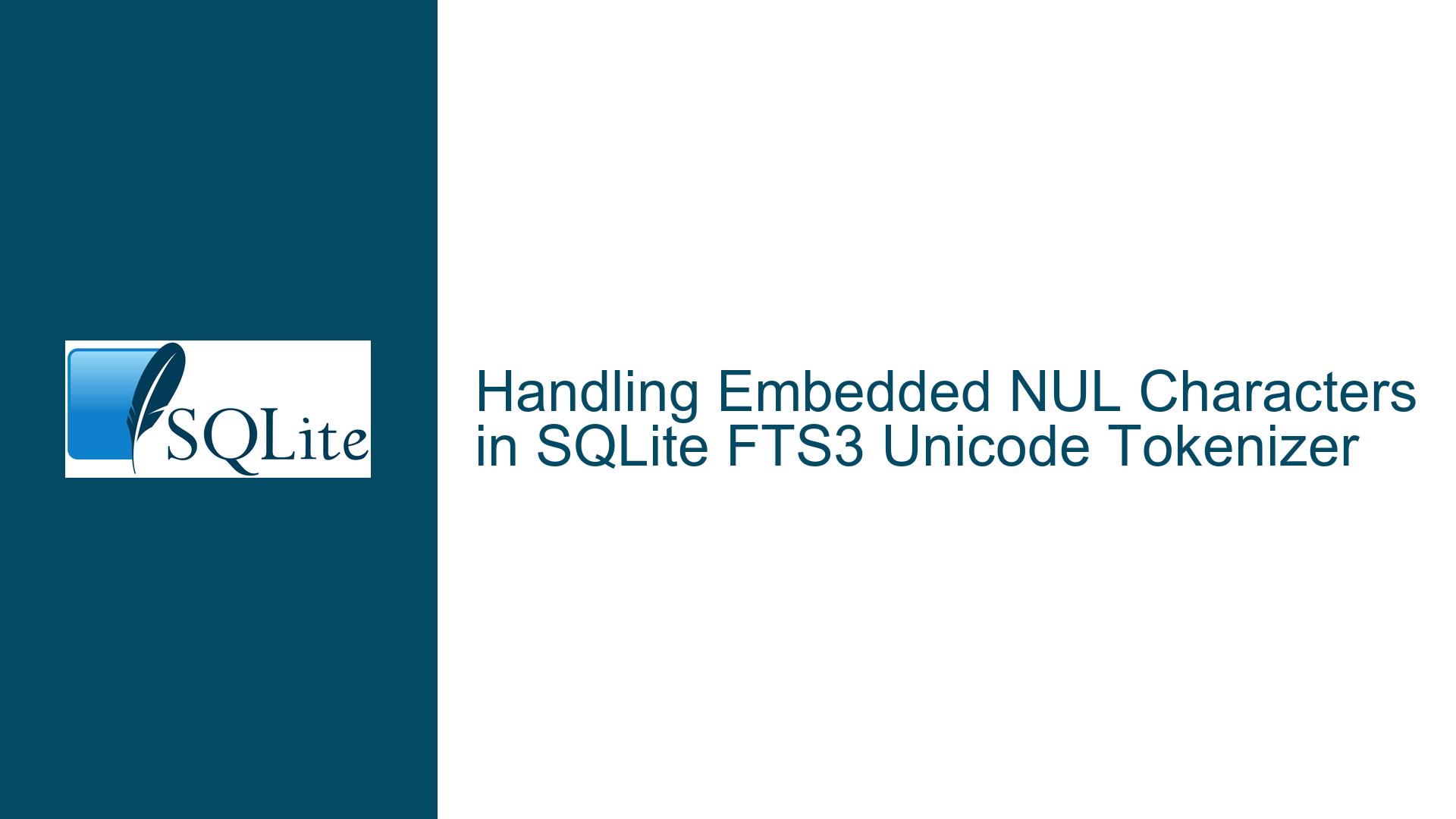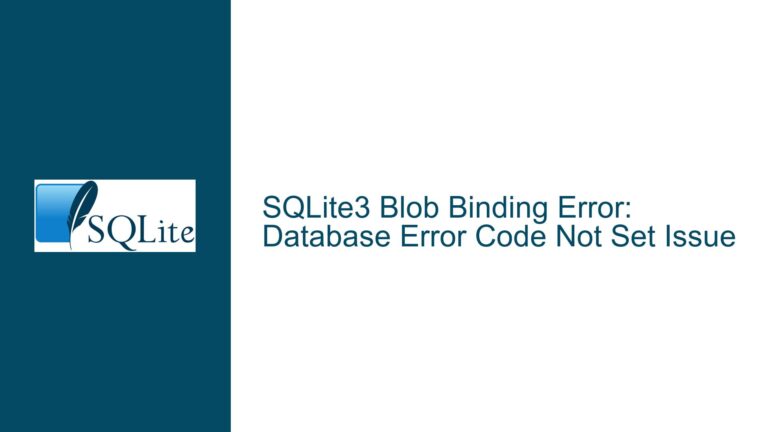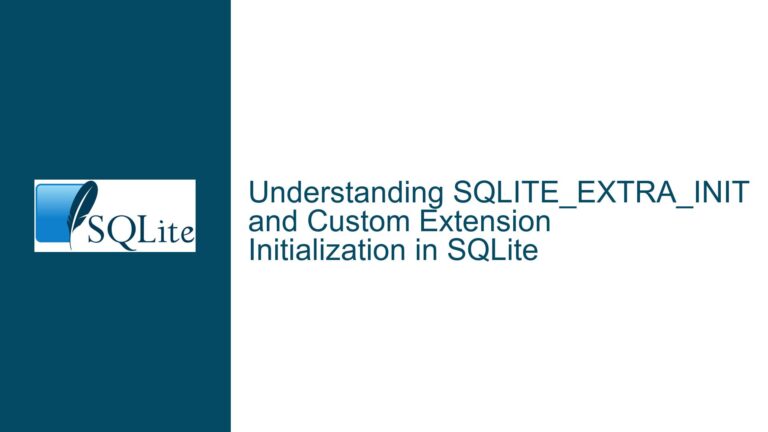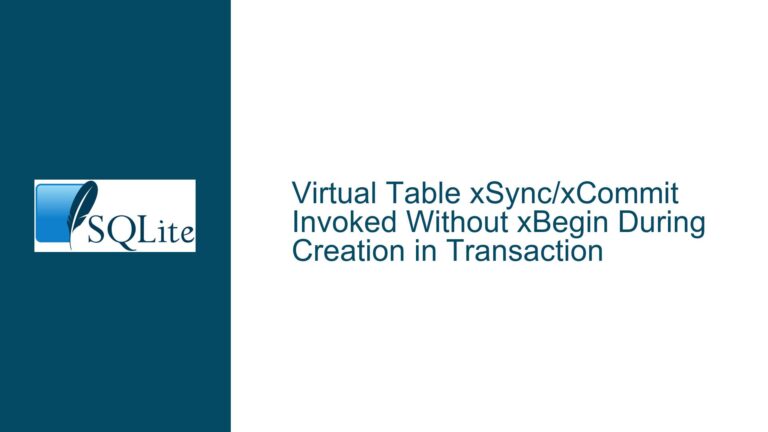Handling Embedded NUL Characters in SQLite FTS3 Unicode Tokenizer
Embedded NUL Characters in FTS3 Unicode Tokenizer
The SQLite Full-Text Search (FTS) module is a powerful tool for implementing full-text search capabilities in SQLite databases. The FTS3 and FTS4 extensions, in particular, provide tokenizers that break down text into searchable tokens. One such tokenizer is the Unicode61 tokenizer, which is designed to handle Unicode text according to the Unicode 6.1 standard. However, a critical issue arises when the tokenizer encounters embedded NUL characters (0x00) within the text. Unlike the FTS5 trigram tokenizer, which was patched to handle such cases, the FTS3 Unicode tokenizer does not explicitly check for or handle embedded NUL characters. This oversight can lead to unexpected behavior, such as premature termination of tokenization, which may not be immediately apparent but can cause subtle issues in search functionality.
The core of the problem lies in the unicodeNext() function within the ext/fts3/fts3_unicode.c file. This function is responsible for reading and processing the next token from the input text. The function uses the READ_UTF8 macro to read UTF-8 encoded characters, but it does not explicitly check for embedded NUL characters after reading each character. As a result, if the input text contains a NUL character, the tokenizer may stop processing the text at that point, leading to incomplete tokenization. This behavior is particularly problematic because NUL characters can appear in text for various reasons, such as binary data embedded in text fields or corrupted data.
The issue is further complicated by the fact that the FTS3 Unicode tokenizer is designed to handle a wide range of Unicode characters, including diacritics and other special characters. The tokenizer uses the sqlite3FtsUnicodeFold() function to normalize characters by converting them to their folded case, and the sqlite3FtsUnicodeIsdiacritic() function to check if a character is a diacritic. However, neither of these functions is designed to handle embedded NUL characters, which means that the tokenizer may not behave as expected when such characters are present in the input text.
Premature Tokenization Termination Due to NUL Characters
The primary cause of the issue is the lack of explicit handling of embedded NUL characters in the unicodeNext() function. When the function encounters a NUL character, it may stop processing the text at that point, leading to incomplete tokenization. This behavior is due to the way the READ_UTF8 macro is used in the function. The macro reads a UTF-8 encoded character from the input text and stores it in the iCode variable. However, the function does not check the value of iCode after reading it, which means that if iCode is a NUL character, the function may not process any further characters in the text.
Another potential cause of the issue is the way the tokenizer handles memory allocation for tokens. The tokenizer uses the sqlite3_realloc64() function to dynamically allocate memory for tokens as they are processed. If the tokenizer encounters a NUL character and stops processing the text, it may leave the memory allocation in an inconsistent state, which could lead to memory leaks or other issues. Additionally, the tokenizer does not check for memory allocation failures, which could lead to undefined behavior if the system runs out of memory.
The issue is further exacerbated by the fact that the FTS3 Unicode tokenizer is designed to handle a wide range of Unicode characters, including diacritics and other special characters. The tokenizer uses the sqlite3FtsUnicodeFold() function to normalize characters by converting them to their folded case, and the sqlite3FtsUnicodeIsdiacritic() function to check if a character is a diacritic. However, neither of these functions is designed to handle embedded NUL characters, which means that the tokenizer may not behave as expected when such characters are present in the input text.
Implementing NUL Character Handling and Tokenizer Consistency
To address the issue of embedded NUL characters in the FTS3 Unicode tokenizer, several steps can be taken to ensure that the tokenizer handles such characters consistently and does not prematurely terminate tokenization. The first step is to modify the unicodeNext() function to explicitly check for embedded NUL characters after reading each character using the READ_UTF8 macro. This can be done by adding a check for iCode after the READ_UTF8 macro is called, and skipping any NUL characters that are encountered. This will ensure that the tokenizer continues processing the text even if it encounters a NUL character.
The second step is to ensure that the tokenizer handles memory allocation consistently, even if it encounters a NUL character. This can be done by adding checks for memory allocation failures and ensuring that the tokenizer releases any allocated memory if it encounters an error. Additionally, the tokenizer should be modified to handle cases where the input text contains multiple NUL characters, ensuring that it processes all characters in the text, regardless of whether they are NUL characters or not.
Finally, the tokenizer should be tested extensively to ensure that it handles embedded NUL characters correctly and does not exhibit any unexpected behavior. This can be done by creating test cases that include text with embedded NUL characters and verifying that the tokenizer processes the text correctly. Additionally, the tokenizer should be tested with a wide range of Unicode characters, including diacritics and other special characters, to ensure that it handles all characters consistently.
In conclusion, the issue of embedded NUL characters in the FTS3 Unicode tokenizer can be addressed by modifying the unicodeNext() function to explicitly check for and handle such characters, ensuring consistent memory allocation, and thoroughly testing the tokenizer with a wide range of input text. By taking these steps, the tokenizer can be made more robust and reliable, ensuring that it handles all characters in the input text correctly and does not prematurely terminate tokenization.






